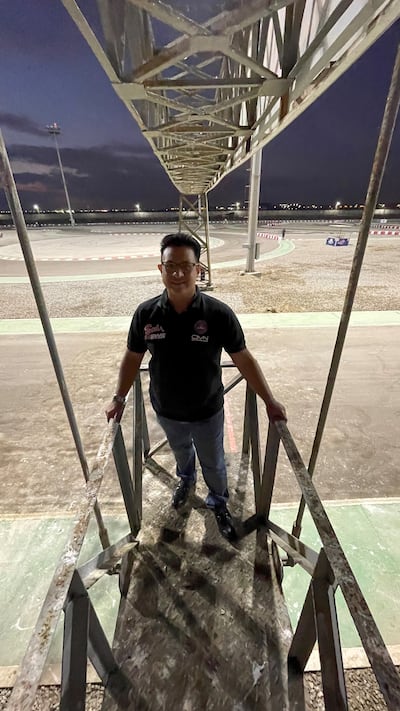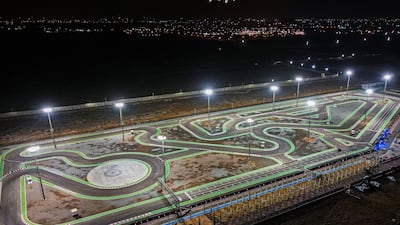I’m standing on the pristine tarmac of the new Omni Karting Circuit in the heart of Karachi. With a track that measures 1.6 kilometres, it’s among the biggest facilities of its kind in the world, boasting 25 corners, up to three individual configurations and an initial fleet of 25 Sodi Karts. At eight metres wide, it has enough space to accommodate drifting, drag racing and single-car autocross events, too. There’s even a skid pan.
The immaculate presentation belies the time and effort it took Syed Ovais Naqvi to build what he calls his "Field of Dreams", after the 1989 sports fantasy movie. Seven years ago, Naqvi and I met up in a coffee shop in The Dubai Mall and he told me about a vision he had already spent some years working on. He envisaged a spectacular first for his home city in Pakistan: a karting circuit that was designed to international standards and to support local talent.
Naqvi came across as passionate, knowledgeable and genuine, but he had to temper his expectations because in some countries, big things are not exactly easy to accomplish, especially if you’re not from the elite class.

Sure enough, a veritable obstacle course peppered with challenges – including securing the right location, negotiating around local politics and battling to articulate his ambitions to those who lacked faith and understanding – pummelled Naqvi’s determination over and over again. “I would get so close, and just as something was about to work out, things would stall or just outright get blocked. Having put in so much effort and repeatedly arriving at a dead end, I was almost ready to give up,” he says.
Somehow, he managed to dig deep enough to persevere and pursue his dream. When the tide finally did turn, Naqvi was in the US, taking some time to figure out what, if anything, could be done next. Once there, he got a phone call out of the blue. “What are you doing in America? You need to come back. There’s a lease for you to sign.”
founder, Omni Karting Circuit
Having finally nabbed what he thought was the ideal site (in the Airmen Golf Course and Recreational Park owned by the Pakistani Air Force), Naqvi was back in play. Or so he thought. It would be another five years from breaking ground on December 10, 2016, before the circuit’s soft opening – in January 2022.
A large part of that was down to the unique construction difficulties the project encountered – from soft and waterlogged soil to a high water table. So the team had to excavate the track and fill it back up, the ground had to be dewatered, and a layer of a geo textile, a costly membrane that acts like a sponge and maintains the integrity of the surface, had to be installed to avoid future erosion.
The asphalt was then finished with a six-millimetre layer of a slurry seal coat to protect against liquid, oil and even UV rays, as well as to improve surface grip. Only then could the building work begin; in fact the pit building was unfinished when I visited in December.
Even so, Naqvi’s infectious passion was undimmed as he walked me around the facility. “I can run it clockwise or anticlockwise in three configurations. The 400-metre-long back straight can be opened up to create a 1/8th mile drag strip with a 200-metre braking zone. The pit building has 30 garages, a workshop and a storage area for equipment, and above that, we’ll have an exclusive members' lounge plus business and media centres, with the rooftop becoming a viewing area.”
A second building, expected to be constructed later this year, will house a reception, motorsport-themed cafe and a shop selling merchandise and racing gear, along with a grandstand and conference hall.
Driving me around the track he designed himself, Naqvi explains he used numerous roads and venues around the world for inspiration, including the Dubai Kartdrome, where he has frequently raced (four of his 30 full-time staff are from the UAE, having worked at the Kartdrome and Yas Marina Circuit).

Taking to the track myself in one of the new SodiKarts, I am stunned by the sheer variety of corners coming at you. A very technical circuit, it features both deceptively fast turns as well as slow hairpins. It becomes clear this can prove a perfect training ground for would-be future F1 champions.
“It’s open to the public to come and have a great day out, but I also want to create championships and nurture new talent,” says Naqvi, who has secured the second-biggest marketing and sponsorship deal in Pakistan’s sports history with Z2C. Next he wants to build more venues in Lahore and Islamabad as well as create a National Speed Festival.
So how does it feel to see a long-held dream finally become a reality? “It’s just exhilarating, to go from planning and drawings to actually driving around it.” Like Kevin Costner’s Ray Kinsella heard in his own Field of Dreams, “If you build it, they will come.”

